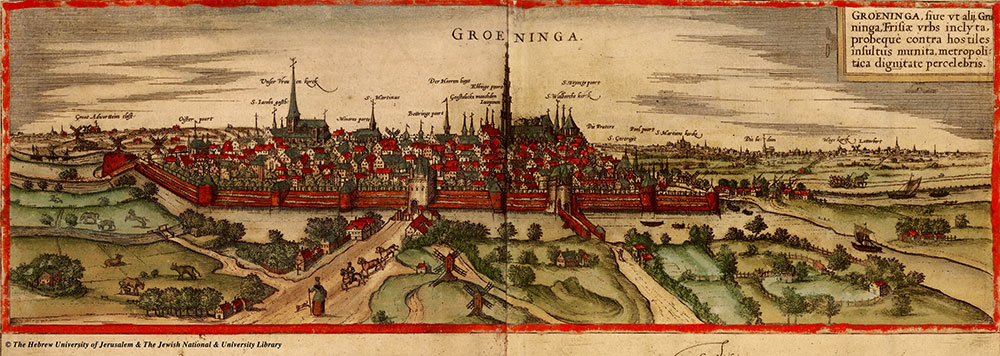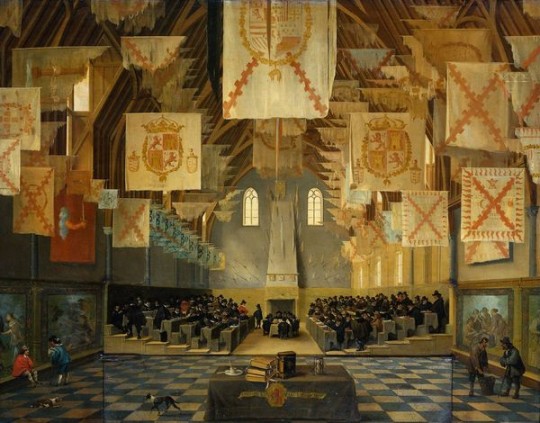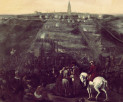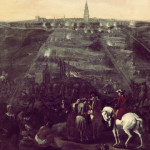Stubborn Groningen gave citizens a chance
Seventeenth century Groningen was a stubborn, pain-in-the-ass of a city. Its administrators did not feel close to the Republic, and rightly so. After all, the Catholic city had been violently forced to join Maurits van Oranje’s Protestant following. That meant that the powers-that-be in The Hague didn’t trust the city one bit. But historian Marike Peterzon thinks this situation meant opportunities for a whole new group of citizens.
Administrative elite
Last Thursday, she obtained her doctoral degree with her research into the administrative elite. She wanted to find out if it was true that there was a clique that hogged jobs such as mayor, council member, judge, or district chief. That is the image people have of Holland, but is this as easily applicable to Groningen?
 View of Groningen, 1572. Coloured copper engraving from the city atlas by Georg Braun and Franz Hogenberg
View of Groningen, 1572. Coloured copper engraving from the city atlas by Georg Braun and Franz Hogenberg
Peterzon doesn’t think so. ‘That’s partly because there simply weren’t enough people’, she says. To this end, she analysed the families of the city council members, or the so-called sworene meente, a precursor to the local council. ‘There were so many children who died’, she says. ‘Only approximately half of them made it to adulthood. And in order to create a proper patrimonial state, the administrator had to be lucky enough to have a son to succeed him.’
Revolution
In addition, joining the Republic caused a small revolution in the city council. The Roman Catholic mayors and council members had to make way for the stadtholder who, from that point forward, had the right to appoint new city administrators. They were Protestants – obviously – whom he trusted. But he went about it very cleverly, says Peterzon. ‘Willem Lodewijk realised that he shouldn’t create a conflict and so he did not appoint people who were unpopular. Instead, he picked people who were in favour of the Republic, but who could also garner support in the city.’
Moreover, these people had the opportunity to move up to other, more prestigious jobs, such as representative to the States General. They were the connection between Groningen and the Republic, and functioned as social brokers, says Peterzon. ‘And that is important for the peaceable formation of a state.’
Influential families
Of course, there were influential families with a lot of power. The Horenken family – who began as beer brewers, but had become full-time administrators by the seventeenth century – definitely had a more considerable say in things than other families. But their role was smaller than initially thought and ordinary citizens had a lot of opportunities to participate in administrative issues.
 States General meeting, 1651
States General meeting, 1651
Take Wicher Frone’s family, for instance – a typical social broker family. ‘Wicher was a rich wine merchant from a community of council members. Of his six children, only his daughters Margrieta and Aaltje made it to adulthood. Margrieta married her cousin Pieter Pott who also became a council member and, later, a judge. But his son, Wicher, became a representative in the States General. This shows how an unknown family can make it to the The Hague in just two generations. And that was not an isolated case.’
Toeing the line
Altogether, these developments caused the city bit by bit to become part of the Republic of the United Netherlands. ‘Early in the seventeenth century, troops were regularly dispatched to Groningen to get the city to toe the line’, says Peterzon. ‘For example, there were often disputes about taxes: the city had no problem levying them, but then they also wanted to decide what to spend them on. And there were also regular conflicts with the Ommelanden that committees from The Hague had to smooth over.’
Halfway through the seventeenth century, however, the city had conformed. This was also the time during which the city, after years of nagging, had the definite right to ‘free choice’ returned to them: they were allowed to choose their own representatives once more.
Peterzon does not yet know what happened to the Roman Catholic elite that had to step down. It’s possilbe they did not remain true to their faith and became Protestants. She also knows stories of Catholic mayors’ daughters marrying Protestant administrators after 1594. ‘But I don’t know the particulars there. I definitely want to get to the bottom of that sometime.’






